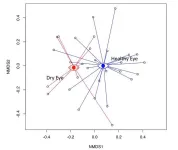(Press-News.org) An opportunistic emergency department stop smoking prompt, comprising brief advice by a trained professional, an e-cigarette starter kit, and referral to local stop smoking services can help smokers quit, with a significant proportion of them still not smoking 6 months later, finds research published online in Emergency Medicine Journal.
Some 6.4 million people in the UK still haven’t stubbed out for good, and of the large numbers of people attending emergency departments, a substantial proportion are more likely to be smokers and have poorer overall health, explain the researchers.
While initiatives in emergency departments to help people stop smoking have shown promise, it’s not clear how well they work over the long term and what elements of them are most effective.
In a bid to find out, the researchers compared usual care with the real-world effectiveness of a brief intervention based in an emergency department to help smokers quit over a 6 month period in the Cessation of Smoking Trial in the Emergency Department (COSTED).
Between January and August 2022, they recruited 972 (out of 1443 screened) adult daily smokers attending the emergency department for medical treatment or accompanying someone who needed it.
Half the participants (484) were randomly allocated to the intervention arm and given brief smoking cessation advice of up to 15 minutes and an e-cigarette starter kit plus advice on its use (up to 15 minutes), as well as a referral to local stop smoking service.
The advice was delivered by a dedicated stop smoking advisor while the patient was waiting to be seen or after discharge. It was tailored to their presenting condition—for example, discussing how not smoking improved wound healing for patients with cuts.
The local stop smoking service routinely followed up with a phone call offering support and, if taken up, advice on how to quit, as well as free provision of nicotine replacement therapy (NRT).
The rest of the participants (488) were randomly allocated to the comparison arm of the trial and given written details of local NHS stop smoking services but weren’t referred directly.
Those reporting that they had stopped smoking at the 6 month assessment were asked to take a carbon monoxide test to biochemically confirm this.
After 6 months, continuous abstinence was just over 7% (35/484) in the intervention group and just over 4% (20/488) in the comparison group, meaning that those given the prompt were 76% more likely to have stopped smoking than those merely signposted to smoking cessation services.
Self-reported 7-day abstinence at 6 months was just over 23% (113/484) in the intervention group and 13% (63/488) in the comparison group.
Those in the intervention group were also more likely to make quit attempts than those in the comparison group: 2 (1–4) vs 1 (0–3). And of those who responded to this query, nearly 40% (125/317) were using an e-cigarette daily at this point.
No serious side effects associated with taking part in the trial were reported.
The researchers acknowledge that those in the comparison group were supported rather more than perhaps would have been the case normally, and managing to obtain a carbon monoxide test to confirm trial participants had stopped smoking proved “very challenging,” they add.
But they point out: “These results strengthen previous findings that [emergency department]-based smoking cessation interventions are effective. To our knowledge, the 6-month self-reported quit rate is the highest reported by any [such] smoking cessation intervention trial to date.”
They conclude: “We consider that this could be rolled out to reach a large proportion of current smokers, although dedicated staff are clearly needed to deliver the intervention so as not to burden clinical staff.”
And this approach is also likely to narrow health inequalities, they suggest: “Those attending [emergency departments] are generally from more deprived communities and more likely to smoke than the general population. Therefore, this intervention has the potential to address health inequalities that arise from disparities in smoking rates between different socioeconomic groups.”
In a linked editorial, Drs Gina Kruse and Jon Samet of the University of Colorado and Dr Joaquin Barnoya of the Integra Cancer Institute, Guatemala City, add that “the high uptake of the trial interventions makes a compelling argument for the potential of a cessation package that includes e-cigarettes for [emergency department] patients.”
But as nearly 40% of participants in the intervention arm were using e-cigarettes daily and over half at least weekly during the 6 month follow-up period, they sound a note of caution.
“We need more information on the long-term use of e-cigarettes after cessation of combustible cigarettes, owing to concerns that persistent use is likely to be seen as a favourable finding by the e-cigarette industry that would profit from continued nicotine dependence,” they write.
And they conclude: “We need to measure the harms to adolescents hand in hand with the potential for benefits to combustible cigarette users if we are to generate informed policies and practices about these devices.”
END
Opportunistic emergency department stop smoking prompt helps smokers quit
Comprises brief advice, e-cigarette starter kit, and referral to local stop smoking services. Significant proportion of patients still not smoking 6 months later
2024-03-27
ELSE PRESS RELEASES FROM THIS DATE:
Consistently exercising 2-3 times a week over the long term linked to lower current insomnia risk
2024-03-27
Consistently exercising 2-3 times a week over the long term is linked to a lower current risk of insomnia as well as the ability to clock up the recommended 6-9 hours of shut eye every night, suggests an international 10-year study published in the open access journal BMJ Open.
Regular exercise is associated with better overall health, and several studies have suggested that physical activity promotes better quality sleep and may improve symptoms of chronic insomnia, note the researchers.
But it’s not entirely clear how much gender, age, weight (BMI), overall fitness, general health and exercise ...
Handing out vapes in A&E helps smokers quit
2024-03-27
Peer reviewed – randomised controlled trial - humans
Giving out free e-cigarette starter packs in hospital emergency departments to people who smoke helps more people quit – according to research from the University of East Anglia.
The trial, funded by the National Institute for Health and Care Research (NIHR), offered advice, an e-cigarette starter pack and referral to stop smoking services to people attending A&E for any reason, to help them to stop smoking.
Six months later, almost one in four people given the starter packs said they had quit smoking. And those who received ...
Shared digital NHS prescribing record could avoid nearly 1 million annual drug errors
2024-03-27
Implementing a single shared digital prescribing record across the NHS in England could avoid nearly 1 million drug errors every year, stopping up to 16,000 fewer patients from being harmed, and saving up to 22 lives every year, suggests a modelling study, published online in BMJ Quality & Safety.
The figures, which are based on the assumption that such a system could reduce medication errors by at least 10%, and by as much as 50%, could also save £millions for the NHS, say the researchers.
Previously published research suggests that drug errors cost the NHS £98 ...
Stanford Medicine-designed AI tools tackle soft tissue sarcomas, identify new treatment strategies
2024-03-26
Using novel machine learning tools developed at Stanford Medicine, researchers have mapped three distinct cellular configurations that correspond to clinical outcomes for patients with a rare, difficult-to-treat cancer called soft tissue sarcoma.
In particular, the technique identified a cellular neighborhood that correlated with a positive response to immunotherapy, which may help physicians make treatment decisions.
“These cancers are challenging,” said Everett Moding, MD, PhD, an assistant professor of radiation oncology. “Up to half of patients diagnosed with a primary tumor will develop distant metastases, but we don’t have a good way to predict ...
ARPA-H awards Columbia researchers nearly $39M to develop a living knee replacement
2024-03-26
A team of researchers from Columbia University Irving Medical Center (CUIMC) and Columbia Engineering has been awarded up to a $38.95 million contract from the Advanced Research Projects Agency for Health (ARPA-H) to build a living knee replacement from biomaterials and human stem cells, including a patient’s own cells. ARPA-H is a federal funding agency that funds transformative biomedical and health research breakthroughs, rapidly translating research from the lab to applications in the marketplace.
The Award
The award, part of the ARPA-H’s Novel Innovations for Tissue Regeneration ...
How genes work together to shape how much you smoke
2024-03-26
Take a puff of nicotine for the first time, and your DNA plays an important role, alongside social and environmental factors, in shaping what happens next.
In recent years, scientists have identified thousands of genetic variants believed to influence everything from when people first try smoking to how good that first cigarette feels to how often they light up and how hard it is to quit. Some variants influence how quickly we metabolize nicotine, while others underlie how sensitive we are to it. But little is known about how they interact with each other and with other genetic differences.
A new University of Colorado Boulder study sheds unprecedented ...
University of Oklahoma engineer receives NSF CAREER Award to advance gas sensing technologies
2024-03-26
NORMAN, OKLA. – Binbin Weng, Ph.D., an engineering professor at the University of Oklahoma, has been awarded a National Science Foundation CAREER Award presented to early-career faculty with the potential to serve as academic role models in research and education. The $497,370 grant will fund his project “Enabling New States of Light in Mid-Wave Infrared Photonics for Gas Sensing Applications.”
Weng says there is a growing demand for distributed gas sensing networks capable of continuously monitoring gas threats on a broad scale. However, current technologies face significant challenges in size, power consumption ...
More than meets the eye: Researchers uncover the microbial secrets of dry eye
2024-03-26
Researchers have used advanced sequencing technology to determine how the mix of microbes present in patients with healthy eyes differs from the mix found in patients with dry eye. The new work could lead to improved treatments for various eye problems and for diseases affecting other parts of the body.
Microbial communities in and on our body — collectively referred to as the human microbiota — play an essential role in keeping us healthy. Although many studies have focused on microbial communities in our gut, understanding the microbiota present in other body sites is critical for advancing our knowledge of human health and developing targeted interventions ...
Researchers identify microbes that help plants thwart parasite
2024-03-26
Bacteria that could help one of Africa’s staple crops resist a major pest have been identified by researchers at the University of California, Davis. Their findings, published March 26 in Cell Reports, could improve yields of sorghum, a mainstay of food and drink in West and East African countries.
About 20 percent of Africa’s sorghum crop is lost due to witchweed (Striga hermonthica), a parasitic plant that steals nutrients and water by latching onto the plant’s roots.
In the new study, UC Davis researchers show that soil microbes induce changes in sorghum roots that make the plant more resistant to infection by witchweed. They ...
Late surgical repair for preterm babies born with inguinal hernia shows better results compared to early repair, study finds
2024-03-26
Delaying surgical inguinal hernia repair in preterm infants until after discharge from the neonatal intensive care unit (NICU) appears to reduce the likelihood of serious adverse events, according to researchers at UTHealth Houston.
A study led by first and corresponding author Martin L. Blakely, MD, MS, MMHC, professor of surgery and pediatrics with McGovern Medical School at UTHealth Houston, analyzed the safety of early versus late surgical repair for preterm infants born with an inguinal hernia. The findings were published today in the Journal of the American Medical Association (JAMA).
“The biggest question we wanted ...
LAST 30 PRESS RELEASES:
Study in mice reveals the brain circuits behind why we help others
Online forum to explore how organic carbon amendments can improve soil health while storing carbon
Turning agricultural plastic waste into valuable chemicals with biochar catalysts
Hidden viral networks in soil microplastics may shape the future of sustainable agriculture
Americans don’t just fear driverless cars will crash — they fear mass job losses
Mayo Clinic researchers find combination therapy reduces effects of ‘zombie cells’ in diabetic kidney disease
Preventing breast cancer resistance to CDK4/6 inhibitors using genomic findings
Carbon nanotube fiber ‘textile’ heaters could help industry electrify high-temperature gas heating
Improving your biological age gap is associated with better brain health
Learning makes brain cells work together, not apart
Engineers improve infrared devices using century-old materials
Physicists mathematically create the first ‘ideal glass’
Microbe exposure may not protect against developing allergic disease
Forest damage in Europe to rise by around 20% by 2100 even if warming is limited to 2°C
Rapid population growth helped koala’s recovery from severe genetic bottleneck
CAR-expressing astrocytes target and clear amyloid-β in mouse model of Alzheimer’s disease
Unique Rubisco subunit boosts carbon assimilation in land plants
Climate change will drive increasing forest disturbances across Europe throughout the next century
Enhanced brain cells clear away dementia-related proteins
This odd little plant could help turbocharge crop yields
Flipped chromosomal segments drive natural selection
Whole-genome study of koalas transforms how we understand genetic risk in endangered species
Worcester Polytechnic Institute identifies new tool for predicting Alzheimer’s disease
HSS studies highlight advantages of osseointegration for people with an amputation
Buck Institute launches Healthspan Horizons to turn long-term health data into Actionable healthspan insights
University of Ottawa Heart Institute, the University of Ottawa and McGill University launch ARCHIMEDES to advance health research in Canada
The world’s largest brain research prize awarded for groundbreaking discoveries on how we sense touch and pain
Magnetofluids help to overcome challenges in left atrial appendage occlusion
Brain-clearing cells offer clues to slowing Alzheimer’s disease progression
mRNA therapy restores fertility in genetically infertile mice
[Press-News.org] Opportunistic emergency department stop smoking prompt helps smokers quitComprises brief advice, e-cigarette starter kit, and referral to local stop smoking services. Significant proportion of patients still not smoking 6 months later



